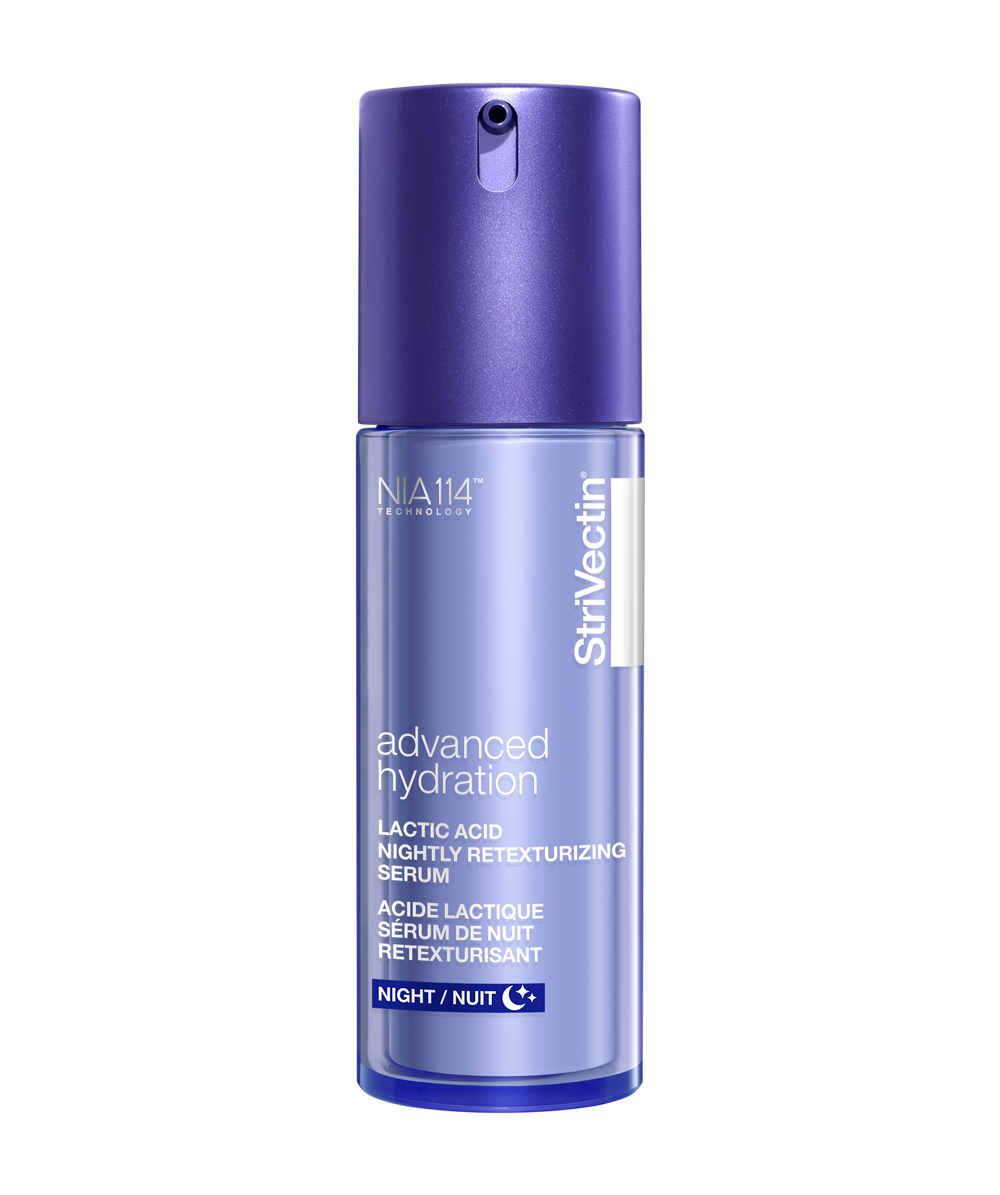These Skin-Care Ingredients Do All The Work While You Sleep
As thrilling as it is to delay sleep for as long as you can (whether it's by going down YouTube rabbit holes, gaming, or doomscrolling), here’s an incentive to call it a night early: better skin health. While you’re asleep, the rest of your body is hard at work doing damage control from the day. And since your skin serves as your body’s first line of defense against all sorts of daytime aggressors, from dry winter air to sun exposure, that overnight repair mode is a non-negotiable for keeping it healthy.
For that reason, a nighttime regimen is important to optimize your skin’s nocturnal recovery. That’s why we’ve partnered with StriVectin to cull together the top five ingredients that make the most of your body’s restorative state, working their renewing benefits overnight.
AdvertisementADVERTISEMENT
Lactic Acid
Lactic acid may be one of the gentler alpha hydroxy acids, but it’s just as effective: It dissolves the glue holding dead skin cells together, and in doing so, it helps enhance glow, even out skin tone, and smooth texture, all with little to no redness or discomfort — which is the typical downside of chemical exfoliants. Lactic acid also has the added ability to increase skin’s natural moisturizing factors (NMF), naturally occurring molecules that keep it hydrated and soft.
It’s no surprise, then, that lactic acid is the headliner in StriVectin Lactic Acid Nightly Retexturizing Serum, a formula that pairs a vegan lactic acid with soothing blue cypress oil that’s clinically proven to gently improve skin’s radiance and softness in just one night. Apply it after your evening cleanse, and, of course, use sunscreen in the AM since any exfoliation (gentle or otherwise) can make skin more sensitive to sunlight.
Retinoids
What does a retinoid not do? This powerful form of vitamin A speeds up cellular turnover and stimulates collagen production. Translation: It brightens skin, treats breakouts, smooths the appearance of wrinkles and scars, and refines your overall skin texture. You might confuse this overachiever with retinol — the difference being that retinoid describes all vitamin A derivatives and is typically used to describe prescription-strength retinoids, whereas retinol is merely a type of retinoid that is gentler and available over the counter.
Despite all that good stuff, there’s a drawback: In addition to potentially causing dryness and flaking (start off slow if you’re using it for the first time) it can also make skin sensitive to sunlight — which is why it’s best to use at night and to apply sunscreen during the day. Use it in a cream or serum two or three times a week at night, gradually increasing your usage as your skin becomes more tolerant, and follow each application with a moisturizer.
AdvertisementADVERTISEMENT
Squalane Oil
Squalane is a plant-derived version of squa-lene, which is naturally found in the skin (it’s a major component of sebum, aka skin’s natural moisturizer). While squalene is prone to oxidation — meaning it goes bad faster — squalane is not, making it a winning ingredient in skin-care products to address signs of sun damage, improve elasticity, and replenish the skin barrier. That’s important because without a protective layer, your skin can lose moisture overnight.
Squalane is also one of those magical oils that doesn’t have a telltale heavy or greasy feel, which is why it works for all skin types. Find it in hydrating serums and lightweight moisturizers, where it plays nice with other active ingredients. It can also buffer not-so-cute side effects from harsher ingredients like retinoids, so try pairing them overnight to ensure skin stays happy and healthy.
Resveratrol
Resveratrol isn’t just in skin-care products. You can find this plant compound in the skin of red grapes and dark chocolate, too — all things that can help you decompress after a long day. In skin-care products, resveratrol has a calming effect, thanks to its anti-inflammatory properties. It’s also an antioxidant: Research has found that it can actually help repair damage racked up during the day as well as defend skin against free radicals — molecules that wreak havoc on cellular DNA, collagen, and elastin — so you’re ready for whatever the next day brings.
Marula Oil
Marula oil is derived from the nut of the marula tree, a relative of the mango tree. Found growing in the wild throughout Africa, the marula fruit has long been prized for its nutritional value (it’s been found in jams and beer), but its oil is packed with fatty acids, which are naturally found in the skin barrier. In fact, one study found that the oil can both deeply moisturize skin and minimize transepidermal water loss. That said, we suggest applying the oil at night since it could feel too heavy to wear throughout the day and cause pilling under makeup.
AdvertisementADVERTISEMENT








